Select Language

A look at the day ahead in European and global markets from Rae Wee
Closely watched U.S. inflation data this week aroused little excitement in the market, but investors will have another chance to be inspired if Thursday's producer prices and retail sales numbers offer fresh hints on the direction of Fed rate policy.
Expectations are for U.S. retail sales to have bounced back in February after a surprise drop at the start of the year, while the producer price index (PPI) for final demand is also forecast to show a steady increase for the month.
Both are critical data points, given that the PPI numbers feed into the Fed's preferred inflation gauge and that retail sales account for nearly half of household consumption.
Consumer spending is by far the biggest driver of the U.S. economy, which seems still to be in solid shape - thus reducing the need for the world's largest central bank to rush into cutting rates.
Futures pricing now shows a less than 10% chance of an easing cycle beginning in May, according to the CME FedWatch tool, although that could change very quickly as Fed expectations tend to swing from one data point to the next.
The bond market seemed to reflect bets for a higher-for-longer U.S. rates scenario, with the two-year Treasury yield notching a two-week high on Thursday. The dollar, however, was still largely on the back foot. [FRX/]
In Japan, bets that the central bank would soon exit its prolonged ultra-easy rate policy kept the Nikkei under pressure and on track for its worst weekly performance in three months.
Elsewhere, a Washington-based global trade association representing biotechnology companies is taking steps to "separate" from Chinese member Wuxi AppTec, its new CEO said in a letter, a sign of the fraught ties between the world's two largest economies.
Shares of Wuxi AppTec in Hong Kong tumbled more than 9%, while its Shanghai shares fell 4.7%.
Key developments that could influence markets on Thursday:
- U.S. PPI (February)
- U.S. retail sales (February)
- ECB's Isabel Schnabel, Pablo Hernandez de Cos speak
(By Rae Wee; Editing by Edmund Klamann)
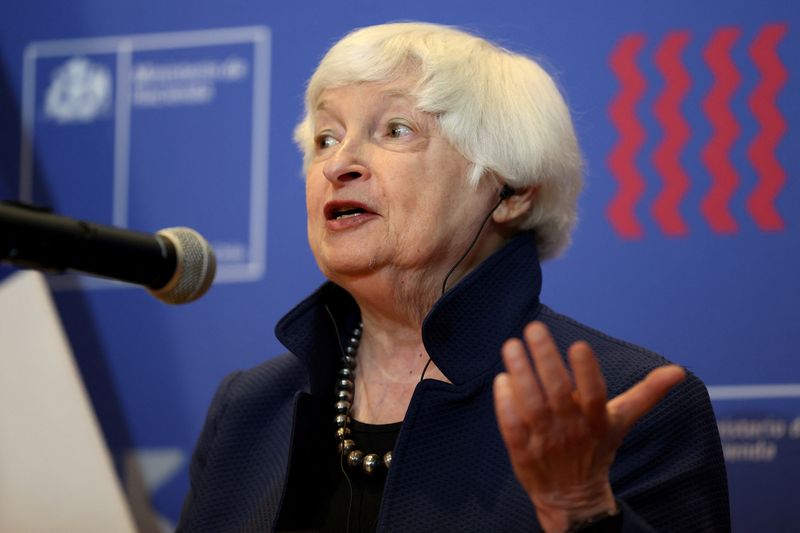
By David Lawder
ELIZABETHTOWN, Kentucky (Reuters) -U.S. Treasury Secretary Janet Yellen on Wednesday said President Joe Biden's administration is taking steps to ensure success of the domestic electric vehicle (EV) industry in the face of China's growing exports in the sector and heavy government subsidies.
Asked whether the United States needs new tariffs on Chinese EVs, Yellen told reporters at a new battery materials plant in Kentucky: "I don't want to get ahead of where we are, but it is a commitment that President Biden has made ... that we're going to want our domestic industry to be successful."
As Chinese demand flags at home amid economic turmoil, its growing exports of EVs to global markets have raised alarm bells in Washington over the potential to inflict harm on U.S. automakers, just as its excess capacity in steel and aluminum decimated U.S. metals producers in past decades.
Current U.S. tariffs of 25% on all Chinese vehicles imposed by former President Donald Trump effectively keeps Chinese EVs out of the U.S. market for now. But China's largest producer, BYD (SZ:002594), has started to export to Mexico and is scouting locations for a Mexican factory.
Some U.S. senators have urged the Biden administration to increase tariffs on Chinese EVs further.
The U.S. Commerce Department has opened a probe into whether Chinese vehicle imports pose national security risks because of the data they transmit, an effort that could lead to additional restrictions on both EVs and conventional cars and trucks.
Another avenue for higher U.S. trade restrictions on Chinese EVs would be a long-running review of the Trump tariffs on hundreds of billions of dollars worth of Chinese imports being conducted by the U.S. Trade Representative's office.
Yellen and other administration officials have called for those "Section 301" tariffs to be made more "strategic" to better protect industries important to U.S. economic security while lowering costs elsewhere.
"It is true that China is investing very massively in this industry and the United States is taking steps to ensure that our industry is successful," Yellen said, without specifying such actions.
A key objective of the 2022 Inflation Reduction Act clean energy incentives, Yellen said, was to cut U.S. dependence on Chinese supply chains for batteries, and associated minerals and components.
Provisions including "foreign entity of concern" rules will make it increasingly difficult for U.S. made EVs to include Chinese content and still qualify for consumer purchase tax credits of $7,500.
Yellen said the U.S. approach aimed to balance "both climate goals and also concern about jobs and having meaningful presence in industries that are going to be driving our economy."
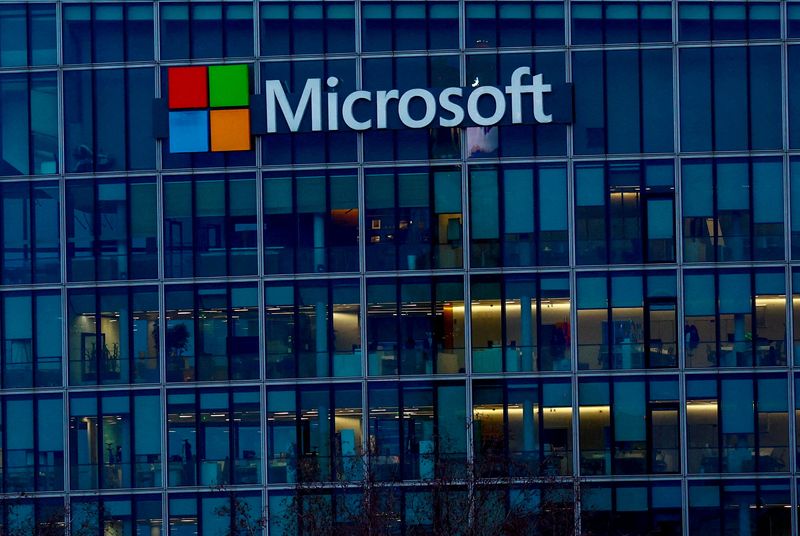
By Lucy Raitano
LONDON (Reuters) - Corporate dividends globally hit an all-time high of $1.66 trillion in 2023, with record payouts by banks making up half of the growth, a report showed on Wednesday.
On a worldwide basis, 86% of listed companies either increased dividends or maintained them, according to the quarterly Janus Henderson Global Dividend Index (JHGDI) report, which also forecast that dividend payouts would hit a new record of $1.72 trillion this year.
The world's biggest dividend payers in 2023 were Microsoft (NASDAQ:MSFT), followed by Apple (NASDAQ:AAPL) and Exxon Mobil (NYSE:XOM).
The total value of corporate dividends rose from $1.57 trillion in 2022 with underlying growth - which accounts for currency movements, special dividends, timing changes and index changes - of 5% from 2022, UK asset manager Janus Henderson said.
"Corporate cash flow in most sectors remained strong and this provided plenty of firepower for dividends and share buybacks," said Ben Lofthouse, head of global equity income at Janus Henderson.
According to LSEG data, earnings growth for the S&P 500 in the fourth quarter of 2023 was expected to come in at 9% year-on-year.
High interest rates have boosted bank margins and banks paid out a record $220 billion to shareholders in 2023, an underlying rise of 15% from 2022 and continuing a rebound after bank payouts were frozen during the pandemic.
Any positive impact from higher banking dividends was almost entirely offset by cuts from the mining sector, the report found, as lower commodity prices weighed on mining profits.
Hefty dividend cuts by five prominent companies - miners BHP and Rio Tinto (NYSE:RIO) as well as Petrobras, Intel (NASDAQ:INTC) and AT&T (NYSE:T) - reduced the underlying 2023 global dividend growth rate by 2 percentage points.
"Beyond these two sectors (banking and mining), whose impact was unusually large, we saw encouraging growth from industries as varied as vehicles, utilities, software, food and engineering, demonstrating the importance of a diversified portfolio," the report said.
On a geographical basis, Europe (excluding the UK), was a key growth driver, contributing two-fifths of the global increase as payouts rose 10.4% on an underlying basis to $300.7 billion.
Japan was also a major contributor, though it was somewhat tempered by a weak yen, the report said.
While the United States made the most significant contribution to global dividend growth due to its size, a 5.1% growth rate was in line with the global average.
Emerging markets dividends were flat on an underlying basis, with Janus Henderson highlighting steep cuts in Brazil and lacklustre growth in China.
Janus Henderson sees another 5% growth in corporate dividends this year to $1.72 trillion.
Even though the rapid increase in bank dividends is likely to slow, rapid declines from the mining sector might also be less impactful, said Lofthouse.
"Energy prices remain firm so oil dividends look well supported and the big defensive sectors like healthcare, food and basic consumer goods should continue to make steady progress."

By Joey Roulette
WASHINGTON (Reuters) - The FAA on Wednesday granted SpaceX a license to test-launch the company's Starship rocket system from Texas, according to the agency's website, paving the way for another early demonstration of a spacecraft crucial to Elon Musk's satellite launch business and NASA's moon program.
"The FAA determined SpaceX met all safety, environmental, policy and financial responsibility requirements," the Federal Aviation Administration (FAA), which oversees launch site safety, said in a statement.
The regulatory sign-off came less than 24 hours before Starship's targeted launch time of 7 a.m. CDT (1200 GMT)on Thursday from SpaceX's Boca Chica, Texas, launch facilities, where the rocket's first two attempts to reach space blasted off from last year.
Starship, a towering two-stage rocket system that will become the centerpiece of Musk's space launch business, will aim to fly farther and clinch more testing objectives than its last two flight tests, including the reignition of the system's upper stage engine and opening its payload door in space.
Unlike the last two tests, both which ended in explosions before reaching a planned splashdown target in the Pacific Ocean near Hawaii, the Thursday test flight will launch on a trajectory bound for the Indian Ocean, a flight profile picked by SpaceX to enable the mission's new test objectives, the company said.
Starship's window to launch on Thursday - and on Friday, as a backup - is from 7 a.m. to 8:51 a.m. CDT (1200 GMT to 1351 GMT), SpaceX said.
NASA, under a roughly $4 billion contract with SpaceX, plans to use Starship in the next few years to send the first crew of humans to the moon's surface since the Apollo era more than half a century ago.
The upcoming Starship test is an early demonstration on a long path to prove itself capable of safely getting astronauts to the moon, a feat that will involve other NASA spacecraft and require extra fuel for Starship supplied in space by a fleet of "tanker" refueling Starships.
SpaceX CEO Musk has said the rocket should fly "hundreds" of uncrewed flights before humans climb aboard. NASA officials in recent months have stressed a need to see faster progress on the rocket's development as it races with China, which envisions its own crewed moonshot by around 2030.
The FAA's commercial space office issued the license with a tight workforce that has struggled in recent years to keep pace with an uptick in private launch activity driven mainly by SpaceX and its novel Starship tests.
The agency this week proposed a $57 million budget for its space office for fiscal year 2025, a 36 percent increase largely meant to grow its regulatory staff and kickstart development of potential regulations for more novel private space activities.
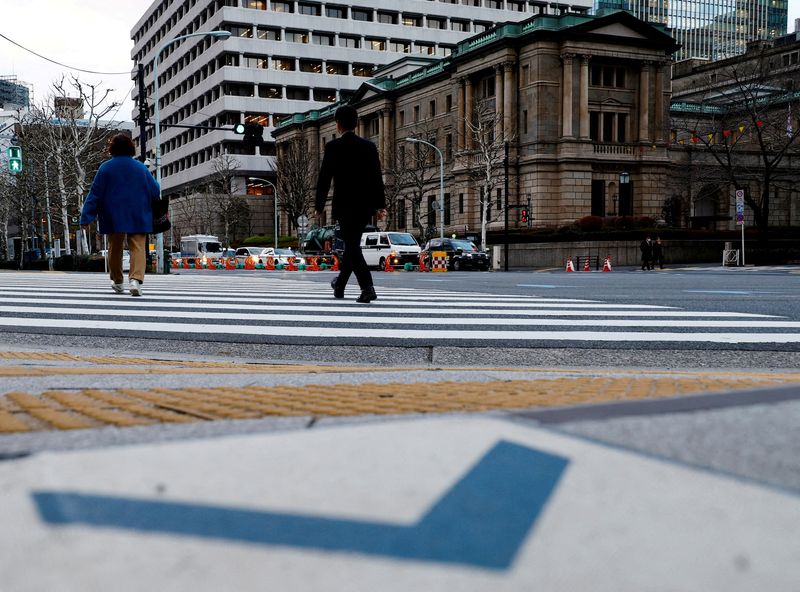
By Tom Westbrook
SINGAPORE (Reuters) - Barely weeks after Japanese stocks broke three-decade highs, the country's financial markets are hurtling toward another phenomenon not seen for the best part of a generation: rising interest rates.
Bankers are attending remedial classes on what to do when rates move and trading rooms are setting up for moribund derivative markets to spring to life -- as they have begun to do.
Their pricing implies a matter of months at the most before the last bastion of a decades-long monetary policy experiment with negative short-term rates falls. An exit by the Bank of Japan is expected by June, with an even chance that rates will rise to zero next week.
Such a move, up 10 basis points, would be small, leaving traders to focus on broader signals: whether any change is implemented immediately, or later, and whether the BOJ winds down its enormous buying programme for assets ranging from Japanese government bonds to listed equity funds.
The symbolism is also heavy as Japan seeks to leave behind "lost" years marked by deflation and reawaken the fourth-biggest economy in the world as a destination for investment -- a change already rippling through corporate Japan and global markets.
"I personally think this is going to be the beginning of a new era," said Keita Matsumoto, head of financial institutions sales and solutions at Citigroup Global Markets Japan.
"It's a fundamental shift in peoples' mindset," he said, one that may take five or 10 years' adjustment as the economy changes.
Some of the biggest implications may be in Japan's 1.3 quadrillion yen ($8.7 trillion) government debt market.
Matsumoto said investors have positioned to benefit from selling of short-dated paper since a rise in central bank deposit rates would quickly draw banks' capital out of bonds and into cash.
Should a bigger policy shift drive longer-term rates up sharply, Japanese investors -- who own some $2.2 trillion in foreign debt -- might also lose their appetite in favour of paper closer to home, which would drag on global bond markets
In foreign exchange, a market that is heavily short the yen has reversed a little in recent days and must adjust to paying interest, albeit small, on the Japanese currency.
Equity investors have been snapping up bank shares on bets loans and margins will grow, though in the last few days trade has turned nervous as the potential policy shift draws near.
The Nikkei, which made a record high above 40,000 last week, posted its sharpest fall in five months on Monday.
"There has been a fair degree of excitement about the Japanese economy and monetary policy ... becoming 'more normal' and like the other countries," said Niraj Athavle, J.P. Morgan's head of sales and marketing in Singapore.
"The equity market, because of the fact that the Japanese are moving out of a deflation forever situation ... is beginning to attract a lot of attention - bond markets and swap markets will follow as Japan tends to become a more normal economy."
SWEET SPOT
Previous hiking cycles in Japan took place under such different circumstances that comparisons are tricky.
In 1989-90 it raised rates by more than 300 basis points, bursting a property bubble and crushing the economy and stock market for a decade. In 2006, an attempt to end a zero-rate policy fell flat as inflation couldn't be sustained.
This time investors and policymakers both point to higher wages and changes in companies' attitudes as new elements. Pay negotiation data due on Friday, before the BOJ meets, can move markets especially if it surprises to the upside.
"Markets still underprice any long-term changes in Japan," said Ales Koutny, head of international rates at Vanguard, who is increasing short exposure to Japanese government bonds.
"A wage number high enough that supports consumption could focus minds on a potential longer hiking cycle."
He sees the five- to 10-year tenors as most vulnerable if the BOJ winds back its support and says 10-year yields could surpass 1% and in the longer term trade like German bunds - which yield 2.3% - if wages, consumption and inflation start to reinforce one another.
Two-year Japanese yields, which track short-term rate expectations, have hit 13-year highs at 0.2%, five-year yields and 10-year yields are around multi-month highs of 0.4% and 0.77%, respectively. [JP/]
The yen, after hitting levels near its cheapest on record in real terms, last week climbed 2% for its sharpest weekly jump on the dollar in eight months as short-sellers retreated slightly.
To be sure the journey out of such a long period of unorthodox policy is fraught and the distortions wrought on the economy will take a long time to unwind. Smaller businesses in particular face challenges from higher borrowing costs.
Crowded bets on bank stocks are vulnerable to "sell the fact" losses on a policy shift, says Nomura's Japan macro strategist Naka Matsuzawa. Already, the BOJ's refusal to buy equity funds when markets fell this week has unnerved some investors.
A yen rally to 135 or 130 to the dollar could also trigger worldwide reverberations, investors say, as that would likely trigger "carry" trades funded in yen to be unwound.
Yet, at 147 to the dollar on Wednesday that is a long way away and most see a tentative return of animal spirits to Japan as a positive.
"In 2024, Japan has neither an overheating property market nor is it mired in deflation," said Byron Gill, managing partner at Indus Capital Partners in San Francisco, with real rates - the nominal rate less inflation - likely to stay sub zero.
"If, at the same time, wage growth can overtake the rate of inflation," he said. "Japan may find itself in a real sweet spot for both the economy and for risk assets."

BANGKOK (Reuters) - The Thai industrial sentiment index fell slightly in February due to slower domestic demand and exports, though tourism lent some support, the Federation of Thai Industries said on Wednesday.
FTI said its industrial sentiment index in February slipped to 90.0 from 90.6 in the previous month.
Domestic demand was weaker than in January due to concerns about high living costs and household debt problems, while exports also slowed as the economies of trading partners remained weak, the FTI said.
Thailand's household debt was about 91% of gross domestic product. The central bank has said a debt level higher than 80% of GDP could be a drag on long-term economic growth and pose risks to the country's financial stability.
However, increased tourism, a hey driver of Thai growth, still supported sentiment, the FTI said, adding that another industrial index that projects sentiment over the next three months rose in February.
Thailand received 7.43 million foreign tourists from Jan. 1 to March 10, up 47% year-on-year, government data shows, with spending of 359 billion baht ($10 billion).
China was the biggest source market with 1.36 million visitors.
The government is aiming for a record 40 million foreign visitors this year, after recording 28.15 million arrivals last year.
($1 = 35.6800 baht)

By Jorge Otaola and Miguel Lo Bianco
BUENOS AIRES (Reuters) -Argentina's monthly inflation rate slowed down more than expected to come in at 13.2% in February, a boost for libertarian President Javier Milei who is pushing tough austerity to try to tame the world's fastest-rising prices.
The still sky-high monthly rate, published on Tuesday, marks a deceleration from January, when prices rose 20.6%, and December, when they were up 25.5%. Analysts polled by Reuters had expected February's inflation rate to land at around 15%.
The 12-month rate through February, however, rose to 276.2%, below a poll forecast of 282.1%, but cementing Argentina's position as having the world's worst inflation, which is hammering people's spending power and driving up poverty.
"The impact of the cost of food is just brutal," said Ines Ambrosini, a 62-year-old who shops in wholesale markets to find deals. "Everything costs a lot of money, the food, the fruit, the vegetables, the meat, the dairy products."
Milei, battling an inherited crisis, has rolled out some tough measures to combat inflation, including painful cuts to state spending, targeting subsidies for things like utilities and transport, while looking to streamline welfare programs.
His government devalued the peso by over 50% in December, which caused prices to leap even faster, so he needs to demonstrate - and quickly - that his economic plan is bearing fruit to keep people onside and avoid unrest on the streets.
Sandra Boluch, a fruit and vegetable seller at a market in Buenos Aires, said she was seeing a worrying trend as inflation soars: sliding sales and more people scavenging for what she throws away, hoping to find enough for a meal.
Poverty is heading toward 60%, according to a report in February, while UNICEF warned on Tuesday that child poverty in Argentina could even hit 70% in the first quarter of the year unless protections were strengthened.
"We have some containers in the back where the garbage is disposed of and when you go with a box, you see 20 people coming up to you to see what they can take as a plate of food to their table," said Boluch, adding that the numbers coming was rising.
"The truth is that it's something very tough, very sad because there are a lot of people and a lot of older people."
Milei's office on social media platform X said after the data was published that the slowdown was due to the government's work to impose "strong fiscal discipline." In a sign of confidence on inflation, the central bank late on Monday cut the interest rate to 80% late.
However, the president has signaled that March could be "complicated," as signals in the economy have looked bleak, with tumbling sales, activity and production.

By Caroline Valetkevitch
NEW YORK (Reuters) -U.S. stocks ended sharply higher on Tuesday, with the S&P 500 registering a record high close as Oracle (NYSE:ORCL) shares surged and consumer price data failed to dampen investors' hopes of interest rate cuts in the coming months.
Shares of Oracle jumped 11.7% and reached a record high, a day after it reported upbeat quarterly results and said it is set to make a joint announcement with artificial intelligence chip giant Nvidia (NASDAQ:NVDA).
Nvidia shares gained 7.2% and an index of semiconductors rose 2.1% and snapped a two-day losing streak.
The Labor Department reported that the Consumer Price Index (CPI) rose 0.4% last month after climbing 0.3% in January. Excluding volatile food and energy components, consumer prices increased 0.4% in February after rising by the same margin in January.
"Investors have gotten comfortable with the notion that it's not about when the Fed will lower rates but rather by how much, and a delay - whether it happens in May like many were initially hoping or in September - ultimately doesn't matter," said Oliver Pursche, senior vice president and advisor for Wealthspire Advisors in Westport, Connecticut.
"It's that they will and that a less restrictive environment is coming."
Traders now see a 70% chance of the first rate cut coming in June, the CME FedWatch Tool showed, versus 71% ahead of the inflation report.
The Dow Jones Industrial Average rose 235.74 points, or 0.61%, to 39,005.4. The S&P 500 gained 57.3 points, or 1.12%, at 5,175.24 and the Nasdaq Composite added 246.36 points, or 1.54%, at 16,265.64.
"If you look at economic data, it continues to be pretty strong," Pursche added. "And from my perspective as a consumer, employee and investor, I'd rather have a strong economy and slightly elevated interest rates than a weak economy that requires stimulus."
Producer price data is due later this week.
On the downside, shares of Boeing (NYSE:BA) fell 4.3%. Boeing told employees in a memo on Tuesday it is adding weekly compliance checks for every 737 factory work area and additional audits of equipment to reduce quality problems.
The U.S. Federal Aviation Administration has curbed Boeing production following the mid-air panel blowout on a new Alaska Airlines (N:ALK) 737 MAX 9 jet on Jan. 5.
Also, U.S. carriers warned that their plans to increase capacity were in doubt due to jet delivery delays from Boeing.
Shares of Southwest Airlines (NYSE:LUV) were down 14.9%.
Volume on U.S. exchanges was 10.97 billion shares, compared with the 12.07 billion average for the full session over the last 20 trading days.
Advancing issues outnumbered decliners on the NYSE by a 1.28-to-1 ratio; on Nasdaq, a 1.20-to-1 ratio favored decliners.
The S&P 500 posted 48 new 52-week highs and no new lows; the Nasdaq Composite recorded 59 new highs and 118 new lows.
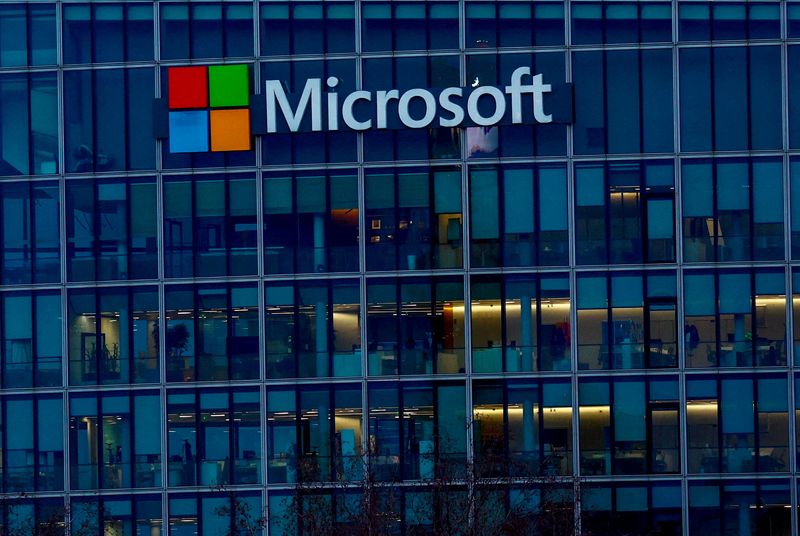
By Lucy Raitano
LONDON (Reuters) - Corporate dividends globally hit an all-time high of $1.66 trillion in 2023, with record payouts by banks making up half of the growth, a report showed on Wednesday.
On a worldwide basis, 86% of listed companies either increased dividends or maintained them, according to the quarterly Janus Henderson Global Dividend Index (JHGDI) report, which also forecast that dividend payouts would hit a new record of $1.72 trillion this year.
The world's biggest dividend payers in 2023 were Microsoft (NASDAQ:MSFT), followed by Apple (NASDAQ:AAPL) and Exxon Mobil (NYSE:XOM).
The total value of corporate dividends rose from $1.57 trillion in 2022 with underlying growth - which accounts for currency movements, special dividends, timing changes and index changes - of 5% from 2022, UK asset manager Janus Henderson said.
"Corporate cash flow in most sectors remained strong and this provided plenty of firepower for dividends and share buybacks," said Ben Lofthouse, head of global equity income at Janus Henderson.
According to LSEG data, earnings growth for the S&P 500 in the fourth quarter of 2023 was expected to come in at 9% year-on-year.
High interest rates have boosted bank margins and banks paid out a record $220 billion to shareholders in 2023, an underlying rise of 15% from 2022 and continuing a rebound after bank payouts were frozen during the pandemic.
Any positive impact from higher banking dividends was almost entirely offset by cuts from the mining sector, the report found, as lower commodity prices weighed on mining profits.
Hefty dividend cuts by five prominent companies - miners BHP and Rio Tinto (NYSE:RIO) as well as Petrobras, Intel (NASDAQ:INTC) and AT&T (NYSE:T) - reduced the underlying 2023 global dividend growth rate by 2 percentage points.
"Beyond these two sectors (banking and mining), whose impact was unusually large, we saw encouraging growth from industries as varied as vehicles, utilities, software, food and engineering, demonstrating the importance of a diversified portfolio," the report said.
On a geographical basis, Europe (excluding the UK), was a key growth driver, contributing two-fifths of the global increase as payouts rose 10.4% on an underlying basis to $300.7 billion.
Japan was also a major contributor, though it was somewhat tempered by a weak yen, the report said.
While the United States made the most significant contribution to global dividend growth due to its size, a 5.1% growth rate was in line with the global average.
Emerging markets dividends were flat on an underlying basis, with Janus Henderson highlighting steep cuts in Brazil and lacklustre growth in China.
Janus Henderson sees another 5% growth in corporate dividends this year to $1.72 trillion.
Even though the rapid increase in bank dividends is likely to slow, rapid declines from the mining sector might also be less impactful, said Lofthouse.
"Energy prices remain firm so oil dividends look well supported and the big defensive sectors like healthcare, food and basic consumer goods should continue to make steady progress."
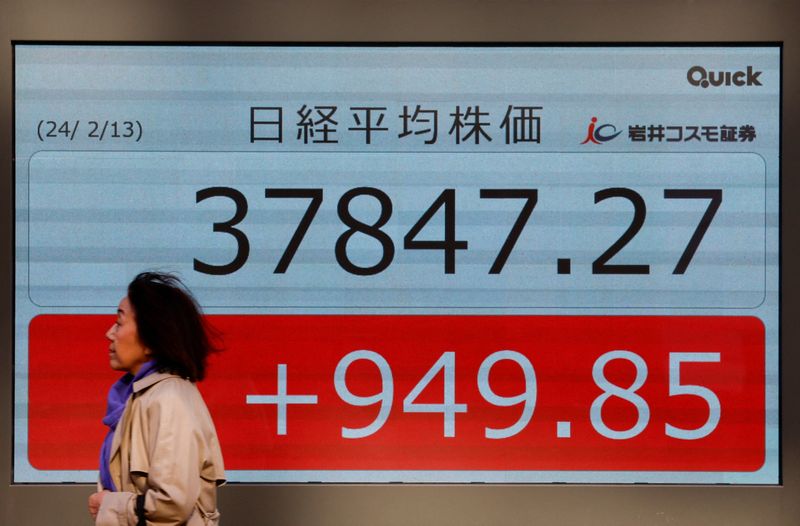
By Ankur Banerjee
SINGAPORE (Reuters) -Asian equities rose on Tuesday led higher by Chinese tech firms although investors' main focus was on key U.S. inflation data, while expectations that the Bank of Japan may be ready to exit ultra-easy policy as soon as next week weighed on the Nikkei.
Gold held just below its record peak and the dollar was steady as traders awaited the U.S. consumer price index later in the day to gauge when the Federal Reserve would likely start its rate cutting cycle.
European bourses are set for a strong open, with the Eurostoxx 50 futures up 0.57%, German DAX futures up 0.57% and FTSE futures 0.74% higher.
The spotlight during Asian hours was firmly on Japan after the BOJ refrained from purchasing Japanese exchange-traded funds on Monday even as local shares dropped sharply, stoking speculation a shift away from ultra-loose monetary policy is right around the corner.
A growing number of BOJ policymakers are warming to the idea of ending negative interest rates this month, four sources familiar with the central bank's thinking told Reuters last week.
The changing expectations have helped the yen perk up over the past week and sent the Nikkei beyond the record peak struck last week.
But on Tuesday, the Nikkei closed 0.06% lower, having dropped 1% during the session, while the yen weakened 0.41% to 147.51 per dollar after Bank of Japan Governor Kazuo Ueda hedged his optimism about the economy ahead of the central bank's policy meeting next week.
Futures now imply a 47% chance the BOJ will shift rates to zero at its meeting on March 18-19, though some still think it might wait until its April 26 meeting.
"The question for investors is whether the BOJ will stop at ending negative rates, or start a tightening cycle. We think the former," Frank Benzimra, head of Asia equity strategy at SocGen told the Reuters Global Markets Forum.
Elsewhere, Chinese stocks rose, with Hong Kong's Hang Seng Index up 2.6% led by the tech sector, while the blue-chip CSI300 index inched up 0.23%.
MSCI's broadest index of Asia-Pacific shares outside Japan rose 0.8% to its highest in more than seven months.
INFLATION WATCH
Investor focus will switch to U.S. inflation data due later on Tuesday, with expectations for a monthly increase of 0.4% and 3.1% on an annual basis. Core consumer prices are seen rising 0.3%, which would nudge the annual pace down to 3.7%.
Vasu Menon, managing director of investment strategy at OCBC Bank in Singapore, said if the data comes in higher-than-expected, that could worry investors, but such concerns may be short-lived.
"Markets have come to realise that the path ahead for inflation will be uneven, and higher-than-expected data for one or two months may not alter the medium-term outlook for inflation which is in a broad downtrend."
Market are all but certain that the U.S. central bank will not cut rates when it meets next week but have priced in more than a 70% chance of a rate cut in June, CME FedWatch Tool showed. Traders are pricing in 90 basis points of cuts this year.
Nicholas Chia, Asia macro strategist at Standard Chartered (OTC:SCBFF), said a "soft-ish inflation report" should give markets some relief, sealing the debate over further Fed hikes on concerns of a re-acceleration in price pressures.
"A Fed adamant on cutting rates in the coming months to dial back policy restriction should also provide another leg-up to the risk rally."
A stronger majority of economists in the latest Reuters poll also expect the Fed to start cutting rates in June. The survey showed respondents saw it more likely that if Fed policymakers changed their rate projections at the March meeting, the median view would signal fewer cuts this year, not more.
The yield on 10-year Treasury notes eased a bit to 4.094%, while the dollar index, which measures the U.S. currency against six rivals, was little changed at 102.82, having hit a roughly two-month low of 102.33 last week. [FRX/]
Spot gold eased a bit to $2,175.79 an ounce, but was not far from the record high of $2,194.99 it touched last week. [GOL/]

